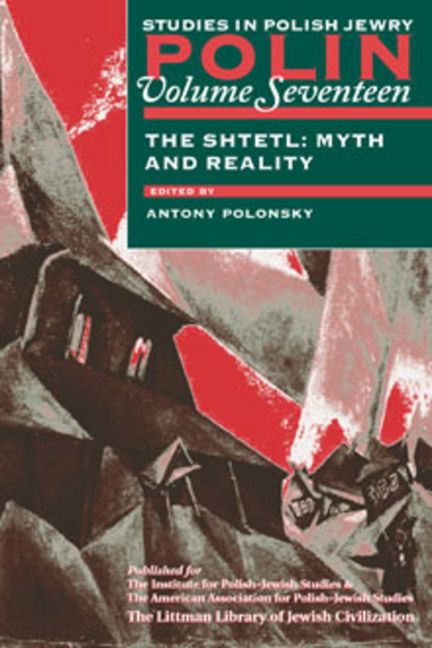Book contents
- Frontmatter
- Dedication
- Editors and Advisers
- Preface
- Polin
- Polin: Studies inPolish Jewry
- Contents
- Note on Place Names
- Note on Transliteration
- List of Abbreviations
- PART I THE SHTETL: MYTH AND REALITY
- PART II NEW VIEWS
- PART III DOCUMENTS
- PART IV THE SIXTY-FIFTH ANNIVERSARY OF EVENTS IN PRZYTYK: A DEBATE
- PART V REVIEWS
- Chone Shmeruk, Hakeriyah lenavi: meḥkerei historiyah vesifrut, edited by Israel Bartal; Chone Shmeruk, Ayarot ukerakhim: perakim beyetsirato shel shalom aleikhem, edited by Chava Turniansky
- Anna Michałowska, Między demokracją oligarchią: Władze gmin żydowskich w Poznaniu i Swarzędzu
- Magdalena Sitarz, Yiddish and Polish Proverbs: Contrastive Analysis Against Cultural Background
- Shmuel Feiner and David Sorkin (eds.), New Perspectives on the Haskalah
- Brian Porter, When Nationalism Began to Hate: Imagining Modern Politics in Nineteenth-Century Poland
- Irena Janicka-Świderska, Jerzy Jarniewicz, and Adam Sumera (eds.), Jewish Themes in English and Polish Culture
- Nancy L. Green (ed.), Jewish Workers in the Modern Diaspora
- Gertrud Pickhan, ‘Gegen den Strom’. Der Allgemeine Jüdische Arbeiterbund ‘Bund’ in Polen, 1918–1939
- Anna Cichopek, Pogrom Żydów w Krakowie, 11 sierpnia 1945 r.
- Michał Horoszewicz, ‘Przez dwa millenia do rzymskiej synagogi’: Szkice o ewolucji postawy Kościoła katolickiego wobec Żydów i judaizmu
- OBITUARIES
- Notes on the Contributors
- Glossary
- Index
Gertrud Pickhan, ‘Gegen den Strom’. Der Allgemeine Jüdische Arbeiterbund ‘Bund’ in Polen, 1918–1939
from PART V - REVIEWS
- Frontmatter
- Dedication
- Editors and Advisers
- Preface
- Polin
- Polin: Studies inPolish Jewry
- Contents
- Note on Place Names
- Note on Transliteration
- List of Abbreviations
- PART I THE SHTETL: MYTH AND REALITY
- PART II NEW VIEWS
- PART III DOCUMENTS
- PART IV THE SIXTY-FIFTH ANNIVERSARY OF EVENTS IN PRZYTYK: A DEBATE
- PART V REVIEWS
- Chone Shmeruk, Hakeriyah lenavi: meḥkerei historiyah vesifrut, edited by Israel Bartal; Chone Shmeruk, Ayarot ukerakhim: perakim beyetsirato shel shalom aleikhem, edited by Chava Turniansky
- Anna Michałowska, Między demokracją oligarchią: Władze gmin żydowskich w Poznaniu i Swarzędzu
- Magdalena Sitarz, Yiddish and Polish Proverbs: Contrastive Analysis Against Cultural Background
- Shmuel Feiner and David Sorkin (eds.), New Perspectives on the Haskalah
- Brian Porter, When Nationalism Began to Hate: Imagining Modern Politics in Nineteenth-Century Poland
- Irena Janicka-Świderska, Jerzy Jarniewicz, and Adam Sumera (eds.), Jewish Themes in English and Polish Culture
- Nancy L. Green (ed.), Jewish Workers in the Modern Diaspora
- Gertrud Pickhan, ‘Gegen den Strom’. Der Allgemeine Jüdische Arbeiterbund ‘Bund’ in Polen, 1918–1939
- Anna Cichopek, Pogrom Żydów w Krakowie, 11 sierpnia 1945 r.
- Michał Horoszewicz, ‘Przez dwa millenia do rzymskiej synagogi’: Szkice o ewolucji postawy Kościoła katolickiego wobec Żydów i judaizmu
- OBITUARIES
- Notes on the Contributors
- Glossary
- Index
Summary
Gertrud Pickhan's book on the history of the Bund in inter-war Poland is the single best work on this theme ever published. It is grounded in extensive original research conducted over ten years; it is unusually insightful and is characterized by persuasive analysis. Pickhan makes particularly good use not only of unpublished materials found in the Bund Archives in New York, but also of important, hitherto unknown sources in Polish archives. She has, moreover, examined unpublished materials located in Germany, the Netherlands, and Russia, and has engaged in an exhaustive search of relevant published works in a number of languages.
Major portions of Pickhan's book are devoted to the reorganization of the Bund in the decade following the First World War, the demographics of the Bund's activists and leadership, the roles played by the Bund in Jewish affairs and in the fostering of Yiddish culture, the relationship of the Bund to Polish parties, and the significance of the approach taken by the Bund to movements and events outside Polish borders. She makes a compelling argument that much of the existing literature on the Bund devotes disproportionate attention to the work of the Bund in tsarist Russia, and insufficient attention to the Bund in inter-war Poland. Pickhan, moreover, provides a notably more positive assessment of the Bund's work in Poland than has the bulk of earlier studies of the subject. Bernard Johnpoll, for example, in The Politics of Futility (which has hitherto been the most authoritative academic book on this topic), concluded that ‘the Polish Bund was a political failure…. It did not become a significant force in interwar Poland.’ Pickhan, on the other hand, accents the degree to which (and the ways in which) the Bund was successful.
Pickhan's conclusion rests in part on her depiction of organizations and institutions related to the Bund or operating under its auspices. Her descriptions of the Medem Sanatorium (a children's institution named after the Bundist theoretician Vladimir Medem), the Tsentrale yidishe shul-organizatsie (Central Organization of Jewish Schools), the Kultur-lige (a publisher of books and periodicals, and supporter of libraries and cultural activities), and Yidishe Arbeter Froy (a Bundistoriented organization for women) are fascinating and thoughtful.
- Type
- Chapter
- Information
- The Shtetl: Myth and Reality , pp. 438 - 440Publisher: Liverpool University PressPrint publication year: 2004



